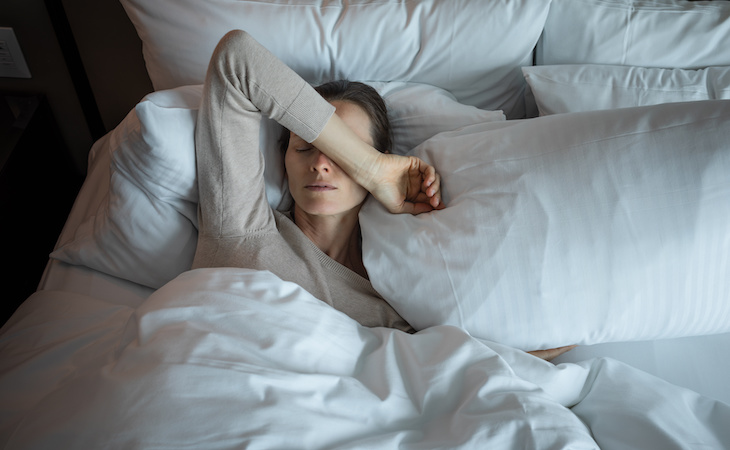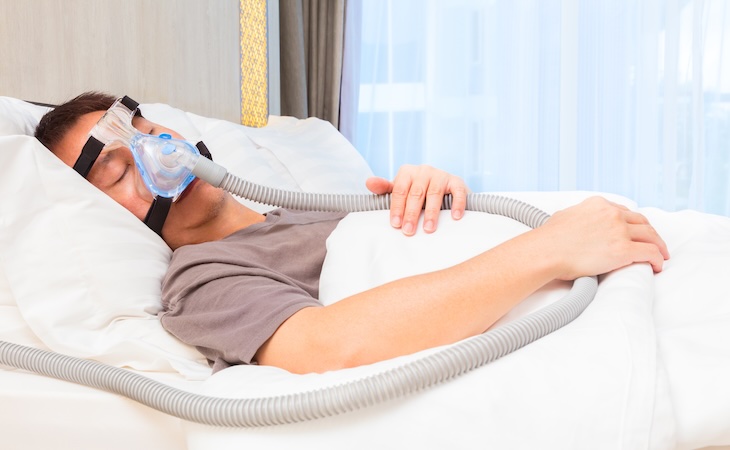It’s no surprise burnout has been on the rise for the last couple of years. The COVID-19 pandemic has led to increased work hours and increased demands at home, leaving so many people stressed to the point of exhaustion.
“Many people with burnout are making themselves much more available than work requires,” says Haley Neidich, licensed clinical social worker in Florida. “They are not sticking to their goals of turning off work at the end of the day.”
Troublingly, research shows professional burnout often comes with sleep-related issues like insomnia. It’s a vicious cycle—you need sleep to avoid burnout, but when you’re burnt out, you can’t exactly sleep well.
So what can you do to prevent professional burnout—and safeguard your sleep—so things don’t get worse? Keep reading to learn more about what burnout is, how to spot the signs of burnout, and get tips for coping with insomnia caused by burnout.
What is burnout?
Burnout is a form of exhaustion. It’s caused by constantly feeling overwhelmed and is the result of excessive physical, emotional, and mental stress. It’s usually caused by job-related issues, but it can also have to do with other aspects of your life such as parenting or caretaking.
There’s no medical diagnosis for burnout, but it can seriously affect your physical and mental health if you don’t address and treat it.
What causes burnout?
When it comes to what causes burnout, there are a variety of factors at play. It’s not just the result of working long hours or having too many responsibilities on your plate, although those can certainly contribute to burnout.
Lack of support from a manager, inability to control how a job is carried out, unclear job expectations, and intense pressure to meet deadlines can all lead to burnout.
What’s the difference between stress and burnout?
One of the most common misconceptions about burnout is that stress and burnout are interchangeable words—but they’re not.
Burnout is an extended period of stress that feels like it’ll never go away. Stress is typically short-lived and tied to something specific.
Short-term stress is usually harmless. If your stress feels like it’s never-ending and also comes with feelings of emptiness and hopelessness, then that could be a sign you have burnout.
Who’s at risk for burnout?
People who work in high-stress jobs are especially susceptible to burnout. As reported in U.S. News & World Reports, the healthcare industry, in particular, has seen a huge bump in burnout among doctors, nurses, and other frontline workers during the pandemic.
According to a study published in Frontiers in Psychology, parents can also burn out. This is especially prevalent now, as the pandemic has increased the stress parents face significantly.
Per an article from the American Psychological Association, parental burnout has different consequences from job burnout: “Unlike a job, parents don’t get paid vacation, and they can’t leave their roles to parent other kids the way that someone with occupational burnout can find a new position.”
What are the signs of burnout?
The World Health Organization recognizes chronic workplace stress as the leading cause of burnout and identifies three core symptoms:
- Energy depletion or exhaustion
- Mental distance from your job or cynicism relating to your job
- Reduced efficiency, productivity, and effectiveness at work
Burnout curbs your energy and can make you feel cynical, resentful, and hopeless. You may also experience physical symptoms like changes to your sleep routine and appetite, headaches, and stomachaches.
You may stop socializing and confiding in friends, family members, and co-workers. You might also become more irritable and lose your cool more frequently. It may feel insurmountable to deal with normal tasks like preparing for a meeting, taking your kids to school, or doing household chores.
In the long term, burnout can lower your immune system so you’re more likely to get the cold or flu. It can also lead to mental health conditions like depression and anxiety.
How does burnout impact your sleep?
According to a study published in Frontiers in Psychiatry, the relationship between burnout and sleep could very well be a two-way street.
“The associations among stress, sleep, and burnout might be bidirectional,” note the study authors. “Whereas, it is plausible that perceived stress exerted effects on burnout both directly and indirectly through the mediating role of sleep quality, it might be just as likely that burnout leads to perceived stress mediated by poor sleep quality.”
In other words, burnout can lead to insomnia, and insomnia can increase burnout. This can lead to a cycle of you being too stressed to sleep and your lack of sleep making you feel even more stressed.
How do you cope with insomnia caused by burnout?
If you’re having trouble falling asleep due to burnout, here are some steps you can take to sleep better and minimize your stress.
1. Acknowledge your feelings
The first step toward relieving your burnout and improving your sleep is admitting you are, indeed, burnt out and need help.
“Most folks believe that they should be able to handle the stress,” says Neidich. “Give yourself permission to be in a tough spot by acknowledging your feelings. Doing so opens the possibility of problem-solving.
2. Stick to a nighttime routine
One of the best ways to get your sleep schedule back on track is to create—and adhere—to a nighttime routine.
“Returning to the childhood basics of a nightly routine is best,” says Neidich. Read our guide to putting together a nighttime routine that works for you to get started.
3. Set boundaries around work
Of course, it’s easier said than done—but setting boundaries around work is key to preventing burnout and, in turn, preventing insomnia.
“Set boundaries around closing your work laptop by a certain time,” suggests Paige Rechtman, licensed psychotherapist in New York City. “That way, you can give yourself time to wind down.”
Unsure of what boundaries are best for you? “Digging a little deeper into how you feel about work will help you determine why you’re burnt out,” says Rechtman. “When you know why you’re burnt out, you’ll develop coping methods.”
4. Eat healthy foods and exercise
Your diet—and exercise routine—can go a long way toward helping you control your stress and keep your sleep on track.
“Eating healthy foods, getting exercise, and drinking water throughout the day makes a difference, says Rechtman. She adds that it’s a good idea to limit alcohol since it can negatively impact your sleep.
A Finnish study focusing on the link between healthy eating and burnout symptoms emphasizes the importance of taking a slow but gradual approach to living a healthy lifestyle.
“Stress management has been shown to moderate the relationship between stress and the consumption of unhealthy food,” note the study authors. “The introduction of education programs to manage stressful situations are likely to help people make good dietary choices.”
Find out which foods can help you sleep better and how morning exercise can improve your sleep.
5. Have a support system in place
“Having a support system can help to anchor us back to reality,” says Rechtman. “It can also give us a healthier perspective on our situation.”
Additionally, having other passions, people you enjoy spending time with, and things you like to do outside of work are all beneficial to your well-being. “This helps relieve some of the stressful symptoms of burnout,” says Rechtman.
6. Try meditation before bed
Studies show meditation can be a good tool for easing anxiety. One study even looked at the effects of meditation on employee stress, depression, and burnout and found it was beneficial for mental and physical health.
Another plus? Meditation can help put you to sleep. “Guided sleep meditations will help you wind down,” says Rechtman. Learn more about the benefits of meditation for sleep and how to meditate from bed.
7. Consider therapy
Therapy can be a great treatment option for burnout, says Neidich.
According to one study, psychotherapy (especially cognitive behavioral therapy, or CBT) is one of the best types of therapy to try if you have burnout. Research shows CBT also helps improve insomnia.
The bottom line on burnout and sleep
Burnout can affect every facet of your life, from your sleep to your relationships. But when you do the hard work required to overcome burnout, good things can happen.
“Often, a person will re-examine what they find important in life and how they spend their time,” says Rechtman. “They will also seek support from others, which creates deeper connections.”
Know that if you’re feeling burnt out right now, it’s OK to ask for help—and to take time to prioritize your well-being. (In fact, experts recommend this!)
The bottom line: Putting practices into place—such as setting work boundaries, following a nighttime routine, and going to therapy—can help you ease burnout-related insomnia and feel better mentally and physically.
For more ways to relieve stress and curb insomnia, check out our self-care tips for better sleep.




